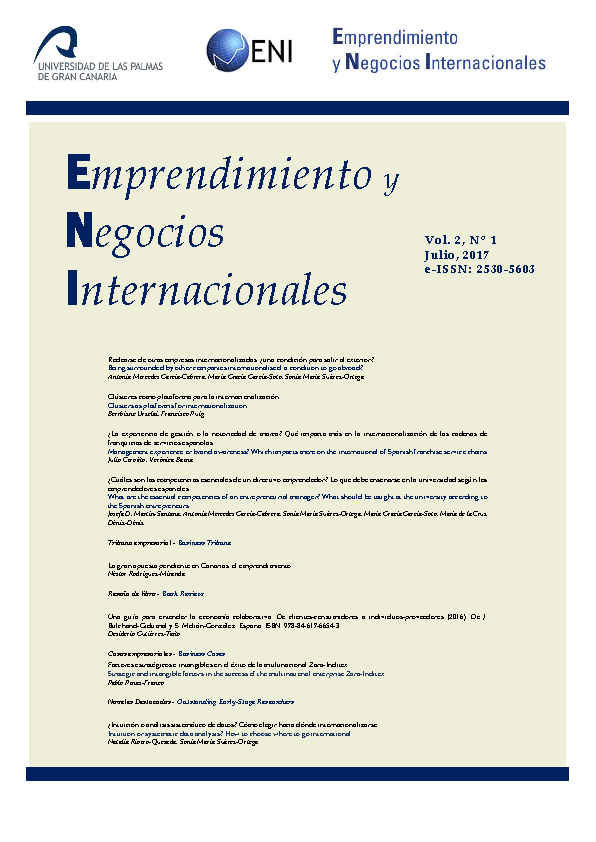Clústeres como plataforma para la internacionalización / Clusters as platforms for internationalization
Abstract
La cooperación empresarial y el intercambio de información y conocimientos son acciones y decisiones que las empresas pueden poner en práctica para competir más eficazmente en entornos globalizados. Esas opciones son más relevantes para las pequeñas y medianas empresas (PYMEs) que deciden acceder y expandirse en y hacia nuevos mercados internacionales. La existencia de esas redes, tanto en origen como en destino, estimula la creación y adquisición de un capital social que permite a los miembros incrementar su capacidad competitiva internacional. El estudio de esas interacciones permitirá mejorar la eficacia del efecto clúster y sus mecanismos.
Business cooperation and the exchange of information and knowledge are actions and decisions that companies can take in order to compete more effectively in globalized markets. These options are even more relevant for small and medium size enterprises (SMEs) that decide to access and expand in new international markets. The existence of these networks, both at the home and host contexts, stimulates the creation and acquisition of social capital, which allows members to increase their international competitive capacity. The study of these interactions allows to improve the cluster effect efficiency and its mechanisms.
Downloads
References
Alfaro, L., & Chen, M.X. (2014). The global agglomeration of multinational firms. Journal of International Economics, 94(2), 263–276.
Boix, R., & Galletto, V. (2005). Identificación de sistemas locales de trabajo y distritos industriales en España. MITYC, Madrid.
Coucke, K., & Sleuwaegen, L. (2008). Offshoring as a survival strategy: evidence from manufacturing firms in Belgium. Journal of International Business Studies, 39(8), 1261–1277.
Hervas-Oliver, J.L., Gonzalez, G., Caja, P., & Sempere-Ripoll, F. (2015). Clusters and industrial districts: Where is the literature going? Identifying emerging sub-fields of research, European Planning Studies, 23(9), 1827–1872.
Johanson, J., & Vahlne, J.-E. (2009). The Uppsala in internationalization process model revisited: From liability of foreignness to liability of outsidership, Journal of International Business Studies, 40(7), 1411–1431.
Martin, R., & Sunley, P. (2011). Conceptualizing Cluster Evolution: Beyond the Life Cycle Model? Regional Studies, 45(10), 1300–1318.
Masciarelli, F. (2011). The strategic value of social capital: How firms capitalize on social assets. Chelthenham: Edward Elgar Publishing.
Meyer, K.E., Mudambi, R., & Narula, R. (2011). Multinational enterprises and local contexts: the opportunities and challenges of multiple embeddedness, Journal of Management, 48(2), 235–252.
Molina-Morales, F.X., & Martínez-Fernández, M.T. (2004). How much difference is there between industrial district firms? A net value creation approach, Research Studies, 33(4), 473–486.
Neffke F., Henning, M., Boschma, R.; Lundquist, K.J., & Olander, L.O. (2011). The Dynamics of Agglomeration Externalities along the Life Cycle of Industries, Regional Studies, 45(1), 49–65.
Plá-Barber, J., & Puig, F. (2009). Is the influence of the industrial district on international activities being eroded by globalization?: Evidence from a traditional manufacturing industry. International Business Review, 18(5), 435–445.
Porter, M.E. (1998). Clusters and the new economics of competition, Harvard Business Review 76(6), 77-90.
Shen, Z. (2015). Clustering and interorganizational dynamics in foreign market entry strategies. Evidence from Chinese MNEs. Tesis doctoral. Universidad de Valencia, Valencia.
Stallkamp, M., Pinkham, B.C., Schotter, A.P., & Buchel, O. (2017). Core or periphery? The effects of country-of-origin agglomerations on the within-country expansion of MNEs. Journal of International Business Studies. Doi: 10.1057/s41267-016-0060-x.
Tan, D., & Meyer, K.E. (2011). Country-of-origin and industry FDI agglomeration of foreign investors in an emerging economy, Journal of International Business Studies, 42(4), 504–520.
Urzelai, B., & Puig, F. (2016). Overcoming liabilities in internationalization process through co-location and social capital. XXVI Conferencia Internacional ACEDE. Vigo, España, 26–28 Junio 2016.
Urzelai, B. (2017). Transnationalization through country-of-origin clusters: drivers and challenges in China. Tesis Doctoral, Universidad de Valencia, Valencia.
Downloads
Published
Issue
Section
License
Derechos de autor propuestos por Creative Commons
1. Política propuesta para revistas que ofrecen acceso abierto
Aquellos autores/as que tengan publicaciones con esta revista, aceptan los términos siguientes:
- Los autores/as conservarán sus derechos de autor y garantizarán a la revista el derecho de primera publicación de su obra, el cuál estará simultáneamente sujeto a la Licencia de reconocimiento de Creative Commons que permite a terceros compartir la obra siempre que se indique su autor y su primera publicación esta revista.
- Los autores/as podrán adoptar otros acuerdos de licencia no exclusiva de distribución de la versión de la obra publicada (p. ej.: depositarla en un archivo telemático institucional o publicarla en un volumen monográfico) siempre que se indique la publicación inicial en esta revista.
- Se permite y recomienda a los autores/as difundir su obra a través de Internet (p. ej.: en archivos telemáticos institucionales o en su página web) antes y durante el proceso de envío, lo cual puede producir intercambios interesantes y aumentar las citas de la obra publicada. (Véase El efecto del acceso abierto).

